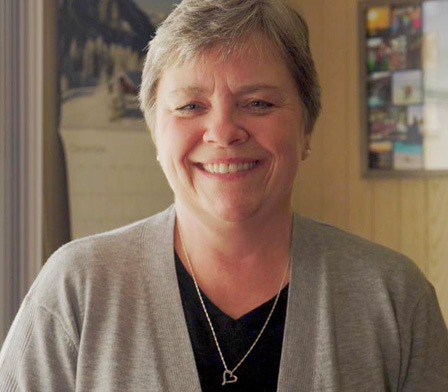A two-time cancer survivor, Diane Davis’ journey is a testament to resilience and hope. Diagnosed with endometrial cancer in 2010 and advanced-stage ovarian cancer in January 2017, Diane faced numerous challenges including grueling surgeries and intense chemotherapy. She received a grim prognosis when three months into chemotherapy, her cancer returned and was growing. Diane’s story took a remarkable turn thanks to molecular profiling, advanced treatments and a strong support system. She shares her experiences and the importance of staying informed, aiming to inspire and support others facing similar challenges.
Molecular profiling is so critical. Learning I had additional treatment options based on my tumor’s specific makeup was lifesaving. Information is such power.”

Diane, please tell us a bit about yourself and your journey with cancer.
My husband, Steve, and I have a very tight-knit family, with two adult children and two grandsons. Steve and I live for our winters in Maine, especially our annual snowmobiling trips with family and friends across the state’s beautiful landscape. My journey with cancer started in 2010 when I was diagnosed with Stage I endometrial cancer, and I underwent a complete hysterectomy. Unfortunately, my battle didn’t end there. In January 2017, my gynecologic oncologist, Dr. Christopher Darus, discovered a softball-sized tumor in my ovary. It had also metastasized to surrounding tissues and my bowels, and this time, it was advanced-stage ovarian cancer. Even though I was no stranger to cancer because of my family’s extensive history with the disease, my diagnosis had me worried I wouldn’t live to join another of the wintertime experiences or see my grandsons grow up.
What were your initial treatments and their outcomes?
Dr. Darus removed my ovaries and 18 inches of my sigmoid colon due to tumor involvement. After surgery, I immediately started on a standard chemotherapy regimen, but after three months of treatment, the cancer was not only back, but had spread to my lymph nodes. Dr. Darus confirmed this was a very ominous sign, and that additional rounds of standard chemotherapy wouldn’t benefit me.
How did you respond to this setback?
It was tough, even with my amazing support system of family, friends and medical team. Steve and I were devastated, but Dr. Darus didn’t give up. He began searching for clinical trials and sent my tumor biopsy to Caris to identify any potential treatment targets with molecular profiling.
What role did molecular profiling play in your treatment?
Caris molecular profiling, which showed the molecular features of my cancer, was a game-changer. Testing revealed that my tumor was microsatellite instability high (MSI-H), which meant it could respond to immunotherapy, and confirmed Dr. Darus’ suspicion of Lynch Syndrome given my family’s cancer history. Results also showed presence of the BRCA2 mutation, which was a surprising discovery, but that opened up even more treatment options we wouldn’t have known to consider. I started immunotherapy in June 2017, and by August, my tumor was gone, and the cancer in my lymph nodes had shrunk considerably. The immunotherapy was effective due to the genomic signature identified through molecular profiling.

Now doctors can look at what is going on with you at the molecular level and then make a treatment plan instead of waiting until something fails. For me the future is so much brighter.”
How has life changed since your treatment?
When my cancer didn’t respond to chemotherapy, my prognosis was very bleak. Thanks to molecular profiling, I went from having no real treatment options to multiple options that would work best for my individual situation. Information is such power. I remain NED (no evidence of disease) five years after my treatment ended and my future is much brighter.
I’ve also become an advocate for ovarian cancer, Lynch Syndrome and biomarker testing awareness. When I found out I had a genomic signature that gave me Lynch Syndrome, I tried to learn everything about it, including how it affected me and my family. Partnering with a genetic counselor at my cancer center, we held the center’s first Lynch Syndrome Awareness Day event. A couple years later, I was selected to attend a Lynch Syndrome Patient workshop in Columbus, OH, where I not only learned a lot but made connections that would lead to further advocacy efforts. The Maine branch of the American Cancer Society Cancer Action Network asked to highlight my story in their efforts to pass legislation to require insurance companies to cover biomarker testing. Working with them, my husband and I attended the Cancer Action Day event at the Maine State House where I spoke to local lawmakers about the importance of biomarker testing and needing it to be available to ALL cancer patients, regardless of financial or insurance situation. I’m hopeful that our efforts will get the legislation passed as every patient should have access to this level of health information.
What message do you have for other cancer patients?
Undergo molecular profiling as it’s critical to learn the genomic makeup of your tumor so your doctor can create a personalized treatment plan for your unique situation. Take advantage of opportunities to connect with others. Important advances in cancer treatment are happening at lightning speed, many of which occur because of grassroots work by patients themselves. Lastly, remain hopeful, learn as much as you can and keep advocating for yourself.

